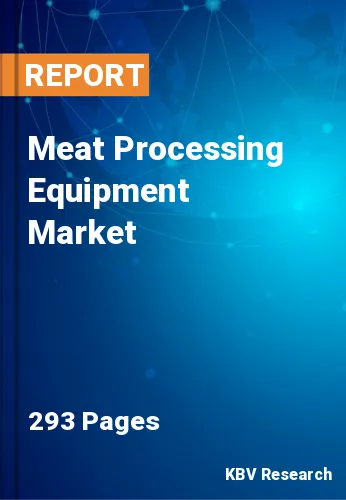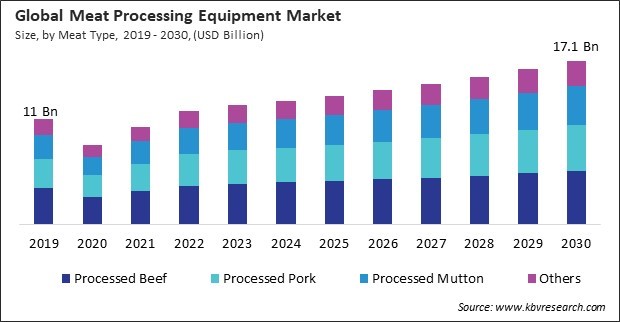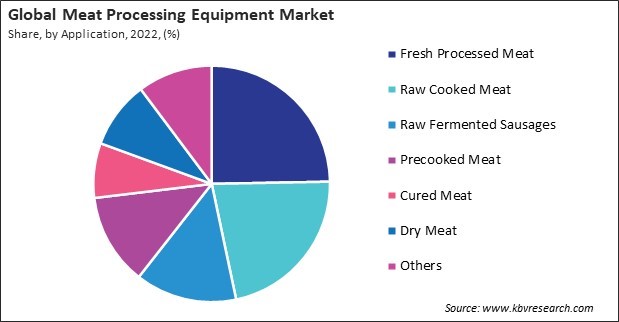
The Global Meat Processing Equipment Market size is expected to reach $17.1 billion by 2030, rising at a market growth of 4.6% CAGR during the forecast period.
Smoking is a key process in curing meat, and advancements in smoking techniques contribute to unique flavors and textures. Therefore, cured meat segment segment captured $882.5 million revenue in the market in 2022. Consumers are increasingly interested in naturally cured and artisanal cured meat products. Equipment designed for natural and artisanal curing methods ensures compliance with consumer preferences for traditional and high-quality products. The cured meat segment caters to retail and foodservice sectors, with consumers seeking these products for home consumption and restaurants using them in prepared dishes.

Consumers are increasingly incorporating processed meat products into their diets due to convenience, time constraints, and changing eating habits. Modern lifestyles, characterized by hectic schedules and dual-income households, drive the demand for convenient and time-saving food options. Consumers increasingly seek ready-to-eat and easy-to-prepare meal options, contributing to the growth of processed meat. Processed meat products offer a wide variety, including sausages, bacon, deli meats, and specialty items, meeting consumer demands for diverse options. Processed meats often have a longer shelf life than fresh cuts, providing consumers with extended storage options. Modern processing and packaging equipment preserve processed meats, enhance their shelf life, and reduce food waste. Additionally, Health-conscious consumers seek leaner meat options as part of a balanced diet. Consumers are increasingly concerned about sodium intake for heart health. Consumers look for meat products incorporating health-promoting ingredients, such as natural herbs, spices, and functional additives. Processing equipment enables the incorporation of specific ingredients, supporting the production of meat items that align with health and wellness trends. The growing awareness of the demand for protein in a balanced diet encourages the demand for high-protein meat products. Processing equipment supports the creation of high-protein and nutrient-rich formulations, contributing to producing health-focused meat products. Thus, because of the growing focus on health and wellness trends, the market is anticipated to increase significantly.
However, Ongoing operational and maintenance costs can be substantial, including energy consumption and periodic equipment servicing. High operational expenses may strain the budgets of meat processors, particularly in cases where energy-efficient and technologically advanced equipment is not in use. The supply and manufacture of this can be affected by global disruptions, including the availability of components and raw materials. Increased lead times may result from supply chain disruptions and delays, affecting the timely implementation of this projects. Small-scale and artisanal meat processors may find it challenging to justify the investment in high-tech processing equipment. The limited adoption of advanced equipment in smaller operations may hinder overall market growth and innovation in certain segments. Thus, high initial investment costs can slow down the growth of the market.
 Drivers
Drivers  Restraints
Restraints  Opportunities
Opportunities  Challenges
Challenges Based on meat type, the market is classified into processed pork, processed beef, processed mutton, and others. The processed pork segment garnered a significant revenue share in the market in 2022. Introducing innovative flavors, seasonings, and packaging formats in processed pork products attracts consumers looking for novel and unique options. Meat processing equipment, including flavoring and packaging machinery, is crucial in innovating and producing new and distinctive processed pork products. Urbanization and a rise in population density contribute to the demand for convenient and easily accessible food options, including processed pork. Consumers' exposure to global cuisines and flavors through travel and the internet has led to a demand for diverse and global-style processed pork products.
On the basis of application, the market is divided into fresh processed meat, precooked meat, raw cooked meat, cured meat, dry meat, raw fermented sausages, and others. In 2022, the fresh processed meat segment dominated the market with maximum revenue share. Fresh processed meat allows for customization in terms of cuts, flavors, and formulations, meeting specific consumer preferences. Specialized equipment enables processors to customize fresh meat processing, supporting the production of unique and premium products that cater to diverse consumer demands. Fresh processed meat often requires precise portioning and packaging to maintain freshness and shelf life.

Based on meat type, the market is classified into processed pork, processed beef, processed mutton, and others. The processed pork segment garnered a significant revenue share in the market in 2022. Introducing innovative flavors, seasonings, and packaging formats in processed pork products attracts consumers looking for novel and unique options. This, including flavoring and packaging machinery, is crucial in innovating and producing new and distinctive processed pork products. Urbanization and a rise in population density contribute to the demand for convenient and easily accessible food options, including processed pork. Consumers' exposure to global cuisines and flavors through travel and the internet has led to a demand for diverse and global-style processed pork products.
Free Valuable Insights: Global Meat Processing Equipment Market size to reach USD 17.1 Billion by 2030
Region-wise, the market is analysed across North America, Europe, Asia Pacific, and LAMEA. In 2022, the Asia Pacific region acquired a significant revenue share in the market. The growing population and rapid urbanization in several Asia Pacific countries increase the demand for processed and convenient meat products. The expanding middle-class population with higher purchasing power contributes to the demand for premium and processed meat products in Asia Pacific. The expansion of modern retail channels and the growth of e-commerce platforms increase consumer access to processed meat products in Asia Pacific.
| Report Attribute | Details |
|---|---|
| Market size value in 2022 | USD 11.8 Billion |
| Market size forecast in 2030 | USD 17.1 Billion |
| Base Year | 2022 |
| Historical Period | 2019 to 2021 |
| Forecast Period | 2023 to 2030 |
| Revenue Growth Rate | CAGR of 4.6% from 2023 to 2030 |
| Number of Pages | 293 |
| Number of Tables | 450 |
| Report coverage | Market Trends, Revenue Estimation and Forecast, Segmentation Analysis, Regional and Country Breakdown, Porter’s 5 Forces Analysis, Company Profiling, Companies Strategic Developments, SWOT Analysis, Winning Imperatives |
| Segments covered | Type, Meat Type, Application, Region |
| Country scope |
|
| Companies Included | GEA Group AG, The MiddleBy Corporation, Heat and Control, Inc., Marelli Holdings Co., Ltd., Key Technology, Inc. (Duravant LLC), JBT Corporation, Illinois Tool Works, Inc., Bettcher Industries, Inc., Welbilt, Inc. (Ali Group), Equipamientos Carnicos, S.L. (Mainca). |
By Meat Type
By Application
By Type
By Geography
This Market size is expected to reach $17.1 billion by 2030.
Rising consumer preference for processed meat are driving the Market in coming years, however, High initial investment costs restraints the growth of the Market.
GEA Group AG, The MiddleBy Corporation, Heat and Control, Inc., Marelli Holdings Co., Ltd., Key Technology, Inc. (Duravant LLC), JBT Corporation, Illinois Tool Works, Inc., Bettcher Industries, Inc., Welbilt, Inc. (Ali Group), Equipamientos Carnicos, S.L. (Mainca).
The expected CAGR of this Market is 4.6% from 2023 to 2030.
The Processed Beef segment is leading the Market by Meat Type in 2022; there by, achieving a market value of $5.6 billion by 2030.
The North America region dominated the Market by Region in 2022, and would continue to be a dominant market till 2030; there by, achieving a market value of $5.7 billion by 2030.
Our team of dedicated experts can provide you with attractive expansion opportunities for your business.
